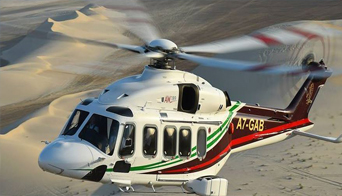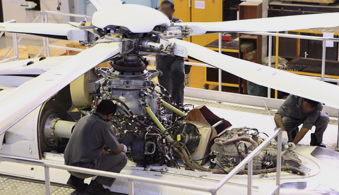Careers with us



| job category | Job Title | posted Date | closing Date |
27/07/2025
closing Date :31/12/2025
Job Objective
As a Material Planner at GHC, you will play a critical role in ensuring the availability of materials and parts necessary to support aircraft maintenance and operation activities. Your primary responsibility will be to efficiently plan, coordinate, and manage the procurement and inventory of aviation materials to support our aviation operations. This position is essential in maintaining our high standards of safety, compliance, and operational efficiency while fostering efficient management and collaboration between various departments; Part 145 Engineering, CAMO (Continuing Airworthiness Management Organization), MRO (Maintenance Repair and Overhaul), outstations, commercial, and business development departments.
Qualifications, Experience & Skills
Qualifications:
Experience:
Job-Specific Skills:
Decision Making Authority
10/07/2025
closing Date :31/12/2025
Job Description:
Ensuring completion of short-term maintenance
Perform Out of Phase Maintenance
Trouble Shooting & Defect Rectification
Performance Indicators
10/07/2025
closing Date :31/12/2025
Job Objective
The Company will nominate one of the pilots to be the helicopter commander for each flight or series of flights.
Key Responsibilities and Accountabilities
Description
•Maintain familiarity with relevant QATAR and International air legislation and agreed aviation practices and procedures;
•Maintain familiarity with such provisions of the Company Operations Manual as are necessary to fulfil his function.
•Responsible for the safe operation of the helicopter and safety of its occupants and cargo whenever the rotors are turning;
•Have authority to give all commands he deems necessary for the purpose of securing the safety of the helicopter and of persons or property carried therein, and all persons carried in the helicopter shall obey such commands;
•Have authority to disembark any person, or any part of the cargo, which in his opinion, may represent a potential hazard to the safety of the helicopter or its occupants;
•Not allow a person to be carried in the helicopter who appears to be under the influence of alcohol or drugs to the extent that the safety of the helicopter or its occupants is likely to be endangered;
•Have the right to refuse transportation of inadmissible passengers, deportees or persons in custody if their carriage poses any risk to the safety of the helicopter or its occupants;
•Ensure that all passengers are fully briefed on:
•use of the seat belt or harness;
•the location and operation of emergency exits;
•the method of locating and jettisoning windows;
•the method of opening and emergency jettisoning of cabin doors;
•the method of deploying life rafts and their subsequent operation;
•deployment and use of the radio beacon (as applicable);
•other type specific safety features;
•the need to read the passenger briefing card;
•the prohibited use of portable electronic equipment such as mobile phones, laptop PCs etc.
•Ensure that all operational procedures and checklists are complied with, in accordance with the Operations Manual;
•Ensure that the weather forecast and reports for the proposed operating area and flight duration indicate that the flight may be conducted without infringing Company operation minima;
•Decide whether or not to accept a helicopter with unserviceablilities allowed by the MEL;
•Take all reasonable steps to ensure that the helicopter, and any required equipment is serviceable;
Description
•In the absence of a qualified Company Engineer, ensure that helicopter refuelling is supervised with particular attention being paid to:
•the correct grade and amount of fuel;
•fuel water checks;
•fire safety precautions;
•checking filler caps for security and correct replacement after refuelling
•Take all reasonable steps to ensure that the helicopter mass and balance is within the calculate limits for the operating conditions;
•Confirm that the helicopter’s performance will enable it to complete safely the proposed flight;
•Not permit any crew member to perform any activity during take-off, initial climb, final approach and landing except those duties required for the safe operation of the helicopter;
•Take all responsible steps to ensure that before take-off and before landing the flight crew are properly secured in their allocated seats;
•Take all reasonable steps to ensure that whenever the helicopter is taxiing, taking off or landing, or whenever he considers it advisable (e.g. in turbulent conditions), all passengers are properly secured in their seats, and all cabin baggage is stowed in the approved stowages;
•Ensure that the documents and manuals in para 8.1.12 are carried and will remain valid throughout the flight or series of flights;
•Ensure that the pre-flight inspection has been carried out.
•Ensure that the Daily Airworthiness Inspection has been carried out either by the Commander concerned or an engineer and that the CRS has been signed.
•Maintain a high personal standard of discipline, conduct and appearance as a representative of the Company.
•The pilot-in-command shall, in an emergency situation that requires immediate decision and action, take any action he considers necessary under the circumstances. In such cases he may deviate from rules, operational procedures, and methods in the interest of safety.
•The commander has the authority to apply greater safety margins including heliport operating minima if he deems it necessary.
•The commander must ensure that, in the event of third party maintenance being required while away from base, the procedures referred to in section 5 of the Helicopter Technical Log complied with.
•The commander must ensure that a continuous listening watch is maintained on the appropriate radio communication frequencies at all times whenever the flight crew is manning the aircraft for the purposes of commencing and/or conducting a flight and taxiing.
•Coach and mentor direct subordinates to develop their skills and ensure continuous people development.
•Perform any other duty as assigned by the Operations Manager / Deputy Operations Manager.
Performance Indicators
•Number of hours flown without incidents vs. target number
•Number of safety issues during flight encountered
•Number of complaints from customer/passengers
Communications & Working Relationships
Internal:
•Operations
•HR
•Finance
External:
•Clients
•Vendors
•Government Institutes
Qualifications & Experience
Qualifications:
•Please refer to Section 5 of the Flight Crew Qualifications (Gulf Helicopters Operations Manual PART A)
Experience:
•As per the above GHC Operations Manual
Skills
•Have a good understanding of FAA regulations
•Have a thorough knowledge of QCAA and EASA regulations.
•Good technical knowledge to be able to work closely with engineering department and understand all the issues clearly.
•Good interpersonal Skills e.g. ability to speak to high level clients and internal customers
24/07/2025
closing Date :31/12/2025
Job Objective
Conducts the procurement of parts, spares, tools and goods for GHC. Conduct procurement activities to ensure that goods are procured under the optimal conditions for GHC and from the reliable sources, as well as participate in the development and maintenance of the procurement policies and procedures.
Qualifications, Experience & Skills
Qualifications:
•Bachelor’s degree in business administration, Engineering, Supply Chain Management, or a related field.
•Proven experience as a Procurement Analyst, Buyer or in a similar role within procurement.
•Professional certification from relevant institutions will be an added advantage
•Strong analytical skills with the ability to collect, organize, analyse, and interpret large datasets.
•Proficiency in MRP and ERP systems as well as M.S. Excel, M.S. Word, and M.S. Power Point and other tools.
•Solid understanding of procurement principles, processes, and best practices.
•Advanced communication and interpersonal skills to collaborate effectively with cross-functional teams and suppliers.
•Detail-oriented with strong problem-solving and critical-thinking abilities.
•Ability to work independently, prioritize tasks, and meet deadlines in a fast-paced environment.
Experience:
•Minimum 2 years of relevant experience
Job-Specific Skills:
•Prior experience in procurement for similar sized organization within a related Strong Negotiation skill
•Excellent command of English
•Very good awareness of Organization's operations including projects and initiatives
•Good understanding of Just-in-Time management and inventory control
24/07/2025
closing Date :31/12/2025
Procurement Officer
Conduct the procurement of parts, spares, tools and goods for GHC. Conduct procurement activities to ensure that goods are procured under the optimal conditions for GHC and from the reliable sources, as well as participate in the development and maintenance of the procurement policies and procedures.
Qualifications:
Experience:
Job-Specific Skills:
10/07/2025
closing Date :31/12/2025
Job Objective
The Supply Chain and Continuous Improvement Specialist at GHC is responsible for streamlining and
improving the end-to-end supply chain processes within the organization. This role involves managing the procurement of materials, optimizing inventory management, and implementing continuous improvement methodologies to enhance operational efficiency. This position involves closely monitoring Reorder Level (ROL) and Maximum Order Level (MOL) parameters and implementing continuous improvement initiatives to optimize our supply chain activities, as well as overseeing supplier performance through data analyses.
The primary goal is to ensure a seamless flow of materials and parts necessary for aircraft maintenance
and operational activities while actively identifying and implementing improvements across various
functions. while fostering continuous improvement by eliminating waste and inefficiencies within the Supply Chain Organization, ensuring that we consistently deliver top-tier aviation services.
Key Responsibilities and Accountabilities
Description
Performance Indicators
Communications & Working Relationships
Internal:
External:
Qualifications, Experience & Skills
Qualifications:
Experience:
Job-Specific Skills:
Decision Making Authority
Behavioral Competencies
Description